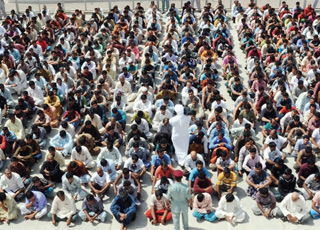
Sharjah, April 6: As many as 720 illegal residents have been arrested in the emirate in the last five days, the police announced on Thursday.
SHARJAH — As many as 720 illegal residents have been arrested in the emirate in the last five days, the police announced on Thursday.
The arrests were made as part of the Sharjah Police’s yearlong campaign to round up illegal residents who have either run away from their sponsors or overstayed their visa period. They were arrested from the emirate’s industrial areas.
Brigadier Abdullah Mubarak Al Dukhan, Deputy Director of the Sharjah Police, said the majority of illegal residents had been involved in illegitimate businesses like selling counterfeit goods or pornographic films.
“The people we arrested were living in abandoned buildings, workshops, dilapidated houses and sites that were under construction. We are taking strict action against such offenders of the residency rules because they are threatening the security of our society, and are most likely to commit crimes,” said Brig Al Dukhan.
He urged the public to cooperate with the police and inform them about illegal residents in their neighbourhoods. The people can call the Najeed service at 800151, SMS to 7999, fax to 06-5529000, email to [email protected] or visit http://www.shjpolice.gov.ae/najeed and report.
720 illegals rounded up in five days in Sharjah
Sharjah, April 6: As many as 720 illegal residents have been arrested in the emirate in the last five days, the police announced on Thursday.
SHARJAH — As many as 720 illegal residents have been arrested in the emirate in the last five days, the police announced on Thursday.
The arrests were made as part of the Sharjah Police’s yearlong campaign to round up illegal residents who have either run away from their sponsors or overstayed their visa period. They were arrested from the emirate’s industrial areas.
Brigadier Abdullah Mubarak Al Dukhan, Deputy Director of the Sharjah Police, said the majority of illegal residents had been involved in illegitimate businesses like selling counterfeit goods or pornographic films.
“The people we arrested were living in abandoned buildings, workshops, dilapidated houses and sites that were under construction. We are taking strict action against such offenders of the residency rules because they are threatening the security of our society, and are most likely to commit crimes,” said Brig Al Dukhan.
He urged the public to cooperate with the police and inform them about illegal residents in their neighbourhoods. The people can call the Najeed service at 800151, SMS to 7999, fax to 06-5529000, email to [email protected] or visit http://www.shjpolice.gov.ae/najeed and report.





Comments
Add new comment